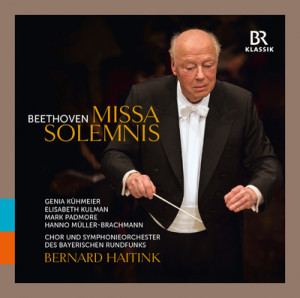This performance of Beethoven’s thorniest choral work is what one might expect from the great Bernard Haitink: pinpoint precision and an authentic, non-doctrinaire, ego-free reading. Beethoven’s religious beliefs were similarly non-dogmatic and universal, but passionate. This is a performance much to be admired, but I was rarely overwhelmed by it, which I find a flaw in the impeccable performance. If I wanted to learn this complex, deeply felt, at times bombastic, almost uncomfortably intense piece of music, I might start with this recording. But once I heard a few others, I’d realize that I’d had perhaps the finest introduction to it, but that it required further study.
There are massive moments in the Missa that seem to require a bully of a conductor to control them, but Haitink shows that the work never needs mania, just utter devotion. Yet Beethoven was a visionary and trailblazer, and there’s none of that here. The Kyrie begins in a dignified fashion, as marked; Haitink’s attention to dynamics and his chorus and orchestra’s ability to follow them is splendid, and the sforzando and subsequent piano on the first word bode well.
Here and throughout, as he breaks into the choral fabric, tenor Mark Padmore sings with reverent but forceful tone. Soprano Genia Kühmeier similarly is “right” throughout, her well-focused voice rising to Beethoven’s dreadful demands, but I missed both Elisabeth Schwarzkopf’s ability to push through the notes into their meaning and Gundula Janowitz’s golden tone. Elisabeth Kulman’s mezzo is strong just where it needs to be–in the middle–so you can actually hear her through the other voices and instruments. And bass-baritone Hanno Müller-Brachmann has a fine voice, though it lacks the sepulchral “feel” of, say Kurt Moll’s. And the chorus never falters, not even for the sopranos’ repeated high As and B-flats, which can sound desperate, or the tenors’ singing long lines of E-F-G-A-flat, which elsewhere sound angry. The engineers have done a magnificent job, with nary a distorted note on the almost 80-minute single CD.
And yet, and yet–the opening of the Gloria should stun; here it is admirable. The”In gloria Dei patris, Amen” chorus that then leads into a shocking, rabble-rousing recap of the opening Gloria text and music does not get the heart pumping. The counterpoint is all clear, but in this section we should be able to smell the napalm in the morning. In the Credo, the “et incarnatus est” is lovely and the “Et resurrexit” is suitably joyful and the “et vitam venturi”, which is almost the musical equivalent of an obstacle course, runs smoothly. The violin solo in the Benedictus fails to bring the listener to tears, and furthermore sounds like it was recorded in another room. The lower limitations of the bass-baritone’s voice become clear as the Agnus Dei opens, and the martial interruption is so well-woven into Haitink’s reading that it doesn’t really intrude, which it should. I’m all in favor of dignity and mystical serenity; I’m similarly in favor of controlled outbursts. But no matter how well made, with the freshest of cream and sugar, I still find vanilla to lack the character of a series of flavors.
There is no dearth of great–not just good–recordings of this work: Robert Shaw’s on Telarc is a superb combination of reverential and awe-inspiring; John Eliot Gardiner’s on Archiv and Philippe Herreweghe’s on Harmonia Mundi stand out among the period-instrument recordings, though some may find the former too glib and the latter too wiry. Otto Klemperer’s legendary EMI recording is monumental and Karajan’s 1966 DG recording is almost too beautiful but irresistible.
































